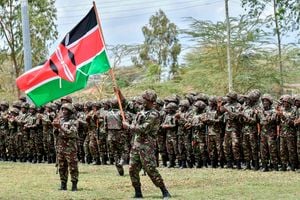Blast and fire escalate nuclear crisis as agency says reactor seal broken

PHOTO| AFP
A boat lies in a street after being washed inshore by the recent tsunami in Hishonomaki, Miyagi prefecture on March 15, 2011. Japan’s government urged people against panic-buying of food and supplies, as the country grapples with an earthquake and tsunami and resulting nuclear crisis.
What you need to know:
- UN weather agency says that winds were currently blowing radioactive material towards the ocean
SENDAI, Japan, Tuesday
Explosions and a fire at Japan’s quake-hit nuclear plant unleashed dangerous levels of radiation on Tuesday, sparking a collapse on the stock market and panic-buying in supermarkets.
In Paris, France, Mr Andre-Claude Lacoste, head of France’s Nuclear Safety Authority (ASN), said today the concrete vessel around the No. 2 reactor at Japan’s Fukushima plant, designed to contain radioactive debris, is “no longer sealed.”
Mr Lacoste was speaking at a press conference in which he also said the accident at Fukushima now rated six on a seven-point international scale of gravity, placing it second to Chernobyl as the world’s worst nuclear disaster.
The ASN is being briefed by the Japanese authorities and by a specialist from France’s Institute for Radiological Protection and Nuclear Safety (IRSN), according to the agency.
The confinement vessel, made out of reinforced concrete, surrounds the steel vessel that houses the nuclear reactor.
It is designed to contain radioactive gas or dust, preventing them from being expelled into the air.
In a press statement, the ASN said two “successive explosions, at 6:10 am and 10:00 am local time probably caused damage to the confinement vessel which is the source of the significant increase in detected radioactive releases.”
Meanwhile, Tokyo stocks, which were punished on Monday in a frantic sell-off that sent indexes around the world sliding, plummeted another 14 per cent today before paring some losses and ending 10.55 per cent down.
In towns and cities, fearful citizens stripped shelves of food and water, prompting the government to warn that panic-buying could hurt its ability to provide aid to areas devastated by Friday’s massive quake and tsunami.
But scared Tokyo residents filled outbound trains and rushed to shops to stock up on face masks and emergency supplies amid heightening fears of radiation headed their way.
Radiation levels around the Fukushima No.1 plant on the eastern coast had “risen considerably”, Prime Minister Naoto Kan said, and his chief spokesman announced it had reached the point where it endangered human health.
In Tokyo, 250 kilometres to the southwest, authorities also said that higher-than-normal radiation levels had been detected in the capital, the world’s biggest urban area, but not at harmful levels.
Mr Kan warned people living up to 10 kilometres beyond a 20 km exclusion zone around the nuclear plant to stay indoors.
“I would like to ask the nation, although this incident is of great concern, I ask you to react very calmly,” he said.
The fire, which was later extinguished with the help of US troops, broke out in the plant’s number-four reactor, meaning that four out of six reactors at the facility were in trouble — and temperatures were reportedly rising in the other two.
Radiation levels later dropped at both the plant and in Tokyo, chief government spokesman Yukio Edano said.
The UN weather agency said that winds were currently blowing radioactive material towards the ocean, and that there were “no implications” for Japan or countries nearby.
On top of the atomic emergency, Japan is struggling to cope with the enormity of the damage from the record quake and the tsunami that raced across vast tracts of its northeast, destroying all before it.
In the only country in the world to have experienced a nuclear attack — two bombs dropped by the United States during World War II killed some 200,000 people — Japanese citizens are gripped by fear of nuclear fallout.
“What we most fear is a radiation leak from the nuclear plant,” Ms Kaoru Hashimoto, 36, a housewife living in Fukushima city, 80 kilometres northwest of the stricken plant, told AFP by phone.
Ms Hashimoto said supermarkets were open but shelves were completely empty. “Many children are sick in this cold weather but pharmacies are closed. Emergency relief goods have not reached evacuation centres in the city.’’ (AFP)




